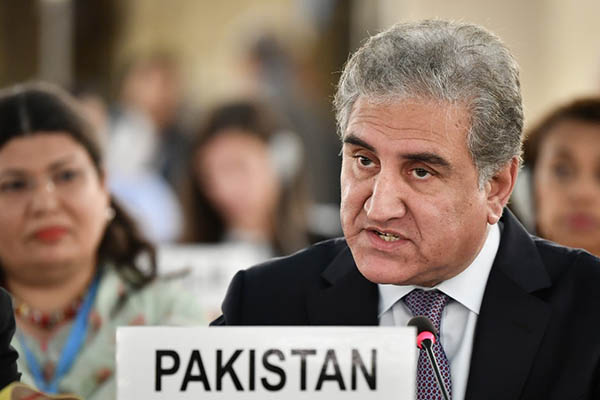
File photo. Fabrice Coffrini—AFP
Foreign minister says new world order requires greater focus on national strength and less on international structures
The Government of Pakistan has a four-point strategy to counter India’s aggression, Foreign Minister Shah Mehmood Qureshi said on Monday, as he stressed the need to rely on national strength over international support.
Addressing a webinar, Annexation of Occupied Jammu and Kashmir: Lessons for Regional Security, that had been organized by the Islamabad Policy Institute, Qureshi said the world have become less predictable due to uncertainties and international organizations had failed to adapt.
He said that the government had formulated a four-point plan to combat India’s expansionist designs, and urged the world to consider doing the same. According to the foreign minister, the government’s strategy includes confronting, exposing and pushing back against New Delhi’s intentions; deterring it through military preparedness, conflict resolution and confidence-building; not being distracted by India’s rhetoric; and continuing with regional integration projects through the China-Pakistan Economic Corridor, the Shanghai Cooperation Organization, and the Economic Cooperation Organization. He said Islamabad also wanted to revive the South Asian Association of Regional Countries.
Shireen Mazari, the human rights minister, also addressed the webinar and noted some areas in which she felt greater diplomatic efforts were required. She said that special emphasis should be placed on highlighting the sufferings of women and children in India-held Kashmir, including by reaching out to women’s rights organizations.
The minister also alleged that Delhi was ramping up its aggression in India-held Kashmir, undertaking acts that were tantamount to genocide. She claimed the threat of war was “imminent,” and warned that any open conflict would inevitably rope in the entire region because of “unintended consequences.”
She also proposed an agreement along the lines of the Good Friday Agreement, which had brought together all parties to the conflict in Northern Ireland and ended decades of violence, as a potential solution to the Kashmir dispute. This would require Pakistan and India accepting the issue as solely bilateral—which goes against Islamabad’s stated claims of pursuing the U.N. Security Council resolutions requiring self-determination for Kashmiris.
In addition to the Pakistani officials, scholars and representatives from India-held Kashmir, China, Iran, Turkey, Bangladesh and Nepal also attended the webinar. Srinagar-based writer and journalist Gowhar Gilani warned that the silence of Kashmiris should not be seen as surrender and urged the global community to take notice of the rapidly changing demography of the occupied region.
